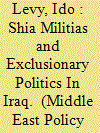| Srl | Item |
| 1 |
ID:
188034


|
|
|
|
|
| Summary/Abstract |
In seeking to overthrow, reform, or separate from an existing political system, both violent and nonviolent resistance organizations emerge. A common finding shows that democracies face violent resistance more so than autocracies. Studied less remains the pattern of organizations using nonviolence in efforts to topple autocratic regimes. What explains these trends in conjunction with one another? I put forth a theory contending that exclusionary politics frames the organizational use of violence and nonviolence in resistance campaigns. To test hypotheses, I analyze an original dataset of over 500 resistance organizations (1940–2014). I complement the large-n tests by reviewing resistance organizations that formed amid Lebanon’s Civil War (1975–1990) and Cedar Revolution (2005) using field methods, qualitative contextualization, and process tracing. The results reveal that the relationship between the target political system and the degree of inclusion of a resistance organization’s constituent identity group helps explain the adoption of violent strategies.
|
|
|
|
|
|
|
|
|
|
|
|
|
|
|
|
| 2 |
ID:
169608


|
|
|
|
|
| Summary/Abstract |
Following the May 12, 2018, parliamentary elections in Iraq, the lists of two prominent militia heads have emerged victorious. The Saairoon Alliance came in first, with 54 of the 329 seats, while the Fatah Alliance took second, with 47. Muqtada as‐Sadr, the Shia cleric and leader of the militia Saraya as‐Salam, and Hadi al‐Amiri, commander of the Badr Organization, head Saairoon and Fatah, respectively.1 These results reflect the widespread support the militias of al‐Hashd ash‐Shaabi, the Popular Mobilization Units (PMUs), have accumulated in their efforts against the Islamic State (IS) terrorist organization. Some PMUs want to assist the military in restoring the government's full control over Iraqi territory and even be incorporated into the military and police. Others receive support from Iran and openly proclaim loyalty to its supreme leader.
|
|
|
|
|
|
|
|
|
|
|
|
|
|
|
|